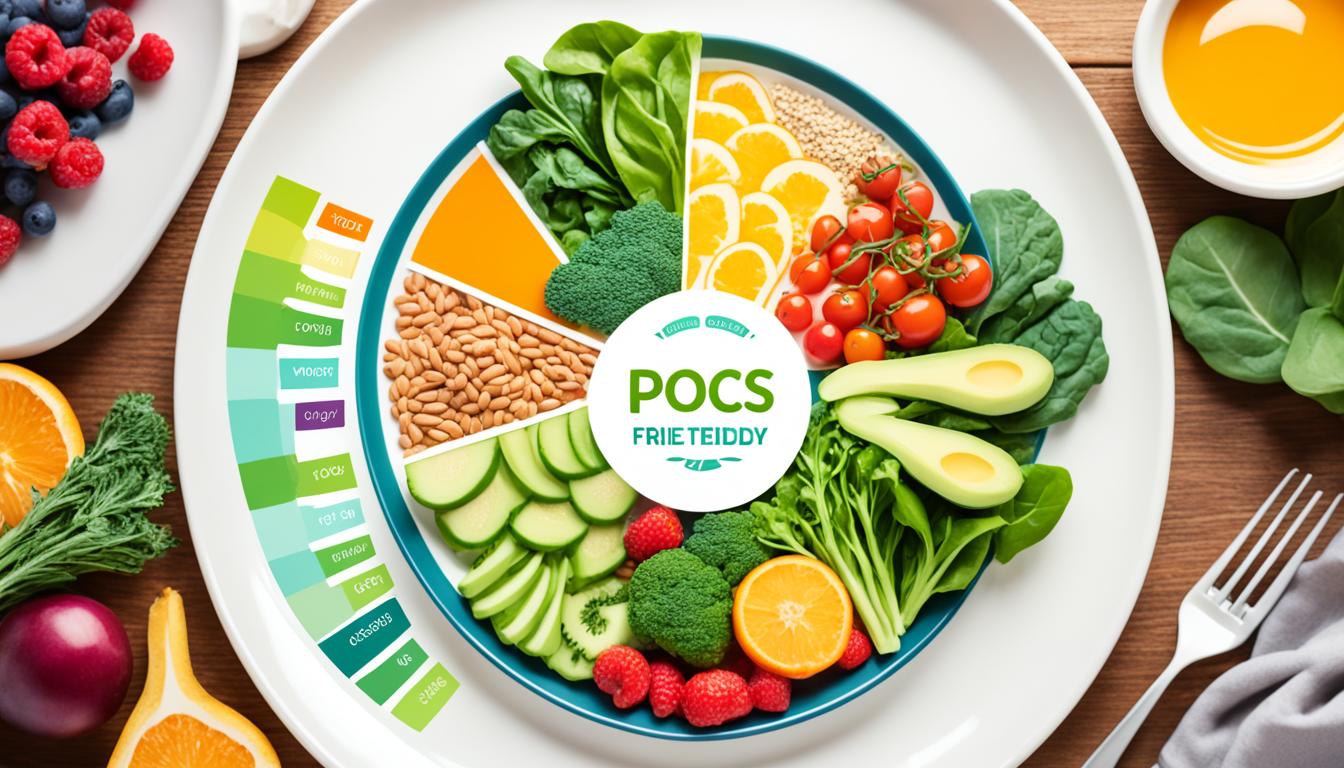Living with Polycystic Ovarian Syndrome (PCOS) is like a rollercoaster. You face hormonal imbalances, irregular periods, and sudden weight gain. The journey is filled with frustration and confusion.
Despite the challenges, I found hope in a personalized PCOS diet plan. I learned that changing my diet could really help. It was the key to managing my health and weight better.
My journey started with lots of research and advice from doctors. I looked into how PCOS affects the body. Eating a variety of PCOS-friendly foods can balance hormones, help with symptoms, and aid in losing weight.
A PCOS weight loss diet is about more than just losing weight. It’s about giving our bodies the right nutrition. Finding a good mix of carbs, proteins, and fats is important for managing insulin and hormones.
I found through trial and error that certain foods really help. Items high in fiber, like whole grains, fruits, and veggies, were major in my diet. Lean proteins, like chicken and tofu, and healthy fats from avocados kept me full and satisfied.
Change came quickly when I started this eating habit. My periods became regular, my energy went up, and I lost weight. These were just the visible changes.
The biggest surprise was how I felt inside. I felt in control of my health and my body. This new way of eating boosted not just my body but my mind too.
If you’re battling PCOS, know you’re not alone. A special PCOS diet can make a huge difference in your life. It opens up a world of better health and joy.
Throughout this article, you’ll learn how to craft a PCOS diet for weight loss. We’ll discuss top foods for PCOS and offer tips and advice for your journey.
Key Takeaways:
- A customized diet plan changes the game for those with PCOS.
- Eating right helps balance hormones, cut down symptoms, and lose weight.
- Foods rich in fiber, like whole grains, fruits, and veggies, are key to good health.
- Lean proteins and healthy fats help feed the body and stop cravings.
- A PCOS diet empowers you to lead a healthier lifestyle.
Learn more about the importance of nutrition in managing PCOS
Understanding PCOS and its Symptoms
PCOS is a hormonal imbalance that affects women of reproductive age. It shows up as a mix of symptoms that change from person to person.
Irregular or missed periods are a common sign of PCOS. This means that women may not have periods often or have them too much. It can be hard to know when you might get pregnant. This can lead to problems having children.
Another symptom is more hair where you don’t want it, called hirsutism. It can be on the face, chest, back, or other spots. This often upsets people with PCOS.
PCOS can also lead to gaining weight. Because of the hormonal issues, it’s harder to keep a healthy weight. This weight gain can make other health issues more likely, like insulin resistance and diabetes type 2.
If you think you have PCOS, see a doctor to get checked. They might do blood tests, ultrasounds, and ask about your health and symptoms. This helps diagnose PCOS.
After diagnosis, your doctor can help you make a plan to deal with PCOS. This plan could include eating well, exercising, and perhaps taking medicine to balance your hormones and treat your symptoms.
Remember, everyone’s experience with PCOS is unique. So, it’s important to work closely with your healthcare team for the right treatment plan for you.
The Importance of a PCOS Diet
A PCOS diet is very important. It helps with the symptoms and can lead to weight loss. This is key because PCOS often causes issues with hormones and insulin.
Eating the right foods is crucial. It helps to balance hormones and control the signs of PCOS. This includes foods that keep your hormones in check and avoid big spikes in blood sugar. Doing this can help you lose weight.

PCOS and Insulin Resistance
PCOS is linked to insulin resistance. This means your body doesn’t use insulin well, causing high blood sugar. But, a PCOS diet can make your body respond better to insulin. This helps with PCOS symptoms and can aid weight loss.
Hormone Regulation
Eating right can balance your hormones. It lowers the effect of hormone issues that come with PCOS. You should eat lots of fruits, veggies, lean meats, and good fats. These foods are great for your hormones.
Weight Loss Benefits
The right PCOS diet helps with weight loss. You should pick foods that don’t spike your blood sugar. This can help you lose weight and lower inflammation.
You need to balance your meals and stay active for the best results.
A PCOS diet is all about choosing healthy foods. It can change how you feel and help you hit your weight loss targets.
Facts to Know about PCOS
Polycystic Ovarian Syndrome (PCOS) affects about 1 in 5 women. It is a common hormonal disorder. It is known to be a top cause of female infertility.
Its causes include both genes and the environment. Hormonal imbalances and insulin resistance are key factors. Interestingly, you can have PCOS even if there are no cysts on the ovaries. This shows how symptoms can vary greatly.
PCOS and Fertility
Many are worried about how PCOS affects fertility. It can make getting pregnant hard by disrupting ovulation. But, many women with PCOS can have kids with medical help.
Correlation between PCOS and Obesity
PCOS often links with obesity. Problems like insulin issues and increased appetite are shared. Keeping a healthy weight can improve symptoms and fertility chances.
Knowing these PCOS facts helps people manage their condition better. It helps in making smart choices in diet and living. With this understanding, getting the right medical help and adopting a tailored strategy for dealing with PCOS is much simpler.
Building Your PCOS Support Team
Dealing with PCOS means working with a team of healthcare experts. They help create a plan that fits your unique needs. This approach can be key to managing your condition effectively.
- Primary Care Physician: Your primary care doctor is crucial in diagnosing and managing your PCOS. They start by checking your health, running tests, and organizing your care plan.
- OB/GYN: An OB/GYN knows a lot about women’s health, especially when it comes to things like fertility and menstrual issues. They might suggest extra tests or treatments based on your PCOS.
- Endocrinologist: Endocrinologists focus on hormone problems, making them vital for your PCOS team. They look into and treat any hormone issues related to your PCOS.
- Nutritionist: A nutritionist can be key in crafting a diet that’s best for managing PCOS. They help choose foods, tackle weight issues, and boost your health overall.
This team will work together to check your symptoms, find out about your PCOS, and come up with a full plan. They consider your past health, how you live, and what you want to achieve. They’ll keep supporting you, track your progress, and update your plan as needed to keep you healthy and happy.
Having a solid PCOS team can really help you understand your condition and find the best path forward. This support is critical for success in your PCOS journey.

The Basics of a PCOS Diet
Managing PCOS well starts with the right diet. Focus on eating high-quality, high-fiber carbs to steady your blood sugar. Choose foods like whole grains, legumes, and vegetables for lasting energy.
A good diet is key for health and controlling PCOS symptoms. Mix in lean proteins such as chicken, fish, tofu, and Greek yogurt. This helps keep you full and supports your muscles.
Eating at regular times is important. It keeps your blood sugar stable, avoiding PCOS flare-ups. Try to eat three meals and two snacks each day without skipping.
Eating foods packed with nutrients can help balance your hormones and ease symptoms. Vitamin D, Vitamin B, Iodine, Selenium, and Magnesium are very helpful. Add fatty fish, eggs, dairy, seaweed, nuts, and seeds to your diet.
For a meal plan that’s right for you, see a nutritionist who knows about PCOS. They will design a diet that meets your specific needs and helps you reach your goals.

Frequently Asked PCOS Diet Questions
Managing PCOS symptoms makes people ask about special diets. They wonder about dairy-free, gluten-free, and other kinds of diets. But, scientific research does not fully back avoiding certain foods for PCOS. Instead, focus on keeping a healthy weight, exercising often, and eating a balanced diet.
Dealing with PCOS means looking at how you live. This includes what you eat, how you stay active, and your overall health. It’s more about eating many different nutritious foods and keeping your weight in check.
Yet, everyone’s PCOS story is different. What helps one person might not help another. For some, cutting out certain foods eases their PCOS symptoms. But for others, it might not do much. Listen to your body. Consider working with a nutritionist for a diet plan that best suits your needs.
Exploring Dietary Options
Thinking about changing your diet for PCOS? First, get info from reliable sources. Then, talk to a healthcare pro before you start.
A recent study highlighted how calorie intake affects PCOS and weight loss. It showed how a varied diet is essential for managing PCOS.
A good PCOS diet is one that’s balanced and fits with your lifestyle. It should include whole, not-processed foods. Finding this balance is crucial for managing PCOS and staying healthy.

- Consult a nutritionist with PCOS knowledge for personalized advice.
- Try out different diets to see how your body reacts.
- Eat foods that help regulate hormones and promote overall health.
- Keep a healthy weight through balanced eating and regular exercise.
- Stay informed with the latest research on PCOS and diet.
How PCOS Affects Blood Sugar and Insulin
Managing PCOS means getting how it messes with blood sugar and insulin. PCOS often links with insulin resistance. This messes up blood sugar levels. To control PCOS, focus on keeping blood sugar levels normal and boosting how your body reacts to insulin.
Insulin resistance is when the body’s cells ignore insulin. This causes a rise in blood sugar. It leads to things like gaining weight, feeling hungry all the time, and being super tired. People with PCOS often face these issues.
It’s key to handle your blood sugar to make insulin work better and lower PCOS effects. One helpful method is to get how the glycemic index (GI) affects carbs you eat.
The glycemic index shows how carbs affect blood sugar. High GI foods quickly up your blood sugar. Low GI foods do this more slowly. Picking low GI foods helps keep your blood sugar and hormones in check.
Eat foods that are low on the GI, like whole grains, beans, veggies, and lean meats. They take longer to break down, which means they don’t flood your blood with sugar right away. This keeps your sugar levels steady and helps your body use insulin better.
Managing blood glucose levels with smart food choices:
- Choose whole grains like quinoa, brown rice, and whole wheat bread instead of refined grains.
- Opt for fruits with a lower GI, such as berries, apples, and citrus fruits.
- Include non-starchy vegetables like leafy greens, broccoli, and bell peppers in your meals.
- Focus on lean proteins like chicken, fish, tofu, and legumes.
- Avoid sugary beverages and opt for water, herbal tea, or unsweetened drinks instead.
By picking these wise foods and minding the glycemic index, you can keep blood sugar under control and help insulin do its job better in those with PCOS. Always team up with your doctor and a dietitian to come up with a plan that fits your health and aims well.

Designing a Meal Plan for PCOS
A good meal plan is key in managing PCOS. Choose healthy foods and eat at the right times. This will help your PCOS and make you feel better. Drinking enough water is also important. It helps keep your hormones balanced and your body working well.
For your meal plan, pick foods that are good for you. Use lean proteins like chicken or tofu. They keep your muscles strong. For carbs, go for whole grains. Foods like quinoa and brown rice are full of fiber and give you lasting energy.
Eat lots of fruits and veggies too. They’re packed with vitamins and minerals. This helps control PCOS symptoms. Try to eat many kinds to get all the good stuff.
Meal Timing
When you eat is as important as what you eat. Eat small meals often, not big ones far apart. This keeps your blood sugar steady and stops you from feeling tired or hungry. Having a regular eating schedule is good for your body and your hormones.
Hydration
Drink enough water to manage your PCOS well. Water is good for your digestion and helps move hormones around. It also cleans out your body and keeps your skin healthy.
Talk to a nutritionist for a meal plan that fits you. They’ll make sure you get all the right nutrients. A nutritionist can design a plan just for you, taking your goals and PCOS needs into account.
Everyone’s journey with PCOS is different. You can help manage yours by choosing the right foods, eating regularly, and drinking water. This supports your health and PCOS management in a personal way.

Lifestyle Factors for PCOS Management
For managing Polycystic Ovarian Syndrome (PCOS), a good diet alone is not enough. It’s also important to focus on lifestyle. This includes exercising regularly, getting enough sleep, and learning how to deal with stress. These steps help your body handle PCOS better.

Regular Exercise: Improving Insulin Sensitivity and Reducing Symptoms
Exercise is key for keeping PCOS under control. It helps you lose weight and boosts how your body reacts to insulin. Try mixing cardio exercises, like walking or biking, with strength exercises, such as lifting weights or doing yoga. This combo can help balance your hormones and lessen PCOS effects. Shoot for 150 minutes of moderate exercise each week.
Restorative Sleep: Promoting Hormone Regulation and Well-Being
Getting enough rest is critical, especially for those with PCOS. A lack of sleep or poor sleep can affect your body’s insulin use, how hungry you feel, and hormone levels. Creating a bedtime ritual, making your sleep space cozy, and sleeping 7-9 hours each night are crucial. If you struggle with sleep, talk to a doctor.
Stress Management: Alleviating PCOS Symptoms
Stress can worsen PCOS symptoms like hormones being off and mood swings. Learning how to manage stress through meditation, deep breathing, or yoga can really help. These activities calm you, lower stress hormones, and make you feel better. Choose methods you enjoy and use them daily.
Regular exercise, good sleep, and managing stress can boost your PCOS diet plan. These lifestyle changes work hand in hand with diet to help balance your hormones. Remember, even small changes in your daily habits can significantly aid your PCOS management and health.
Check out this source to learn more about lifestyle and PCOS management.
Long-Term Health Outlook for PCOS
As a woman managing PCOS, it’s key to know the health risks. PCOS raises the chance of getting type 2 diabetes, heart disease, and metabolic syndrome. Yet, with proper PCOS management and a healthy life, you can lower these risks and better your health for the long term.
Preventing diabetes is important for those with PCOS. Keeping a good weight, eating well, and staying active helps your body react better to insulin. This lowers your diabetes risk a lot.
Preventing heart disease is vital for PCOS women, too. They have a higher risk of heart problems. Eating well, exercising, and keeping stress in check can cut your heart disease risk and boost your heart health.
Reducing Long-Term Health Risks with PCOS Management
Managing PCOS the right way can lessen the health risks. A diet with the right foods like lean proteins, fruits, veggies, and healthy fats can help with diabetes and heart disease. It can also keep your weight stable.
Regular exercise is also crucial for long-term PCOS care. Doing activities like walking, cycling, or swimming can make your body respond better to insulin. This helps lose weight and keeps your heart strong. Try to exercise for 150 minutes each week, over a few days.
Handling stress is key, too. High stress can make PCOS worse and lead to other health issues. Doing things that relax you, like meditation or hobbies, can lower stress. This makes you feel better overall.
To do well with PCOS for the long term, focus on yourself and good habits. Team up with your doctor to make a care plan that fits your needs. By taking charge of your lifestyle and making smart choices, you can lower PCOS health risks and boost your life quality.

Conclusion
A customized PCOS diet plan is key for managing symptoms and losing weight. Eating the right foods and healthy habits can boost your well-being. It’s crucial to team up with healthcare experts for the best advice.
Be ready for a journey towards health. Make changes that you can keep for the long run. Eat healthily, exercise, and handle stress to feel better with PCOS. Remember, each person with PCOS is different, so your plan will be too.
Take charge of your well-being through what you eat. You can get a grip on PCOS and feel better all over. Get going now, and enjoy the journey to being your healthiest and happiest self.














